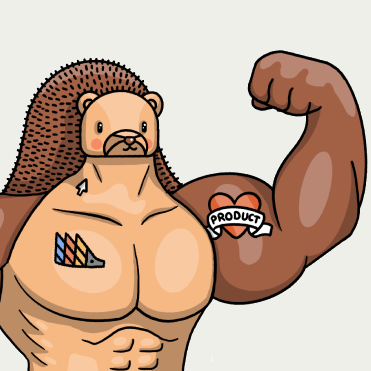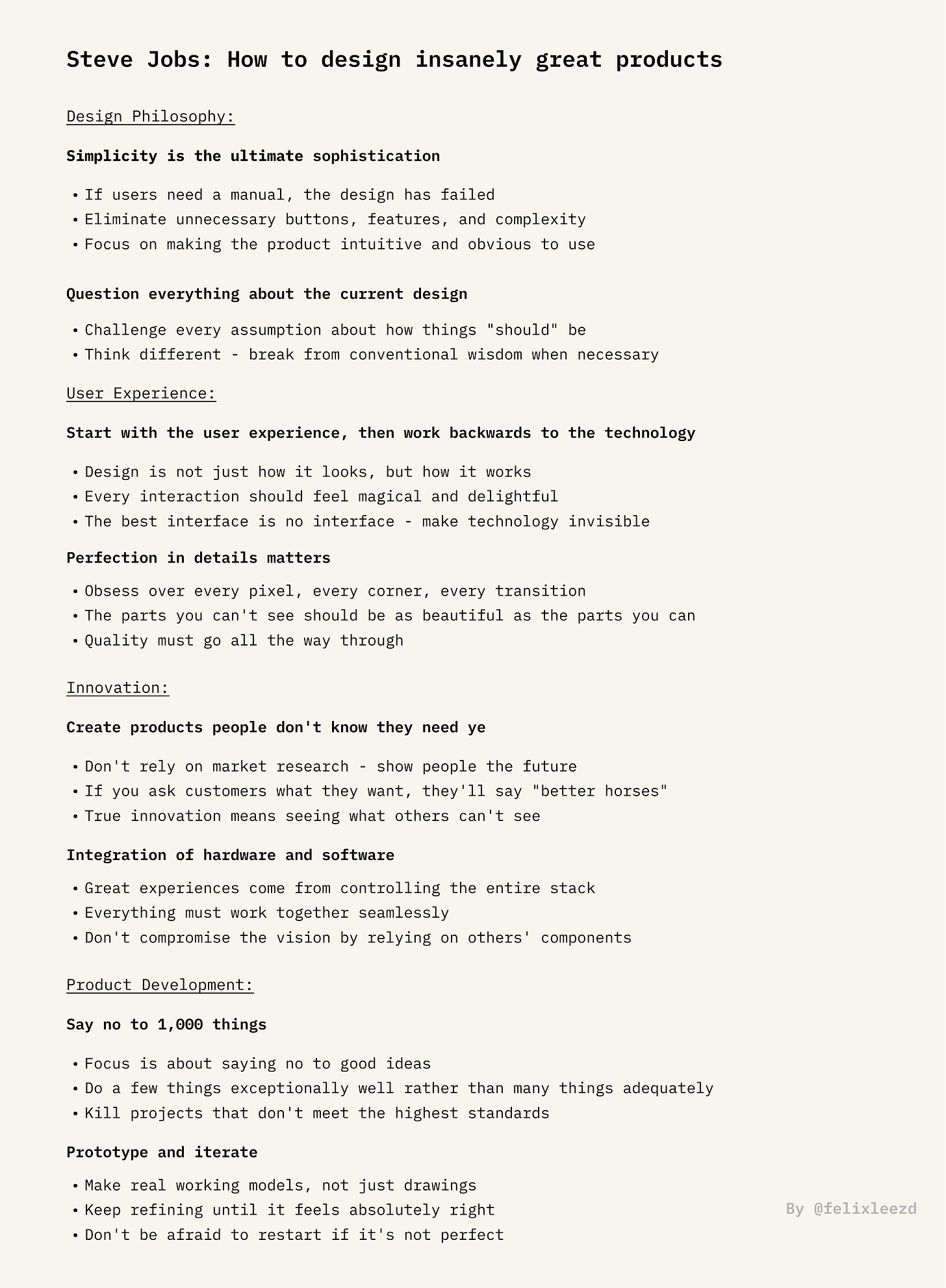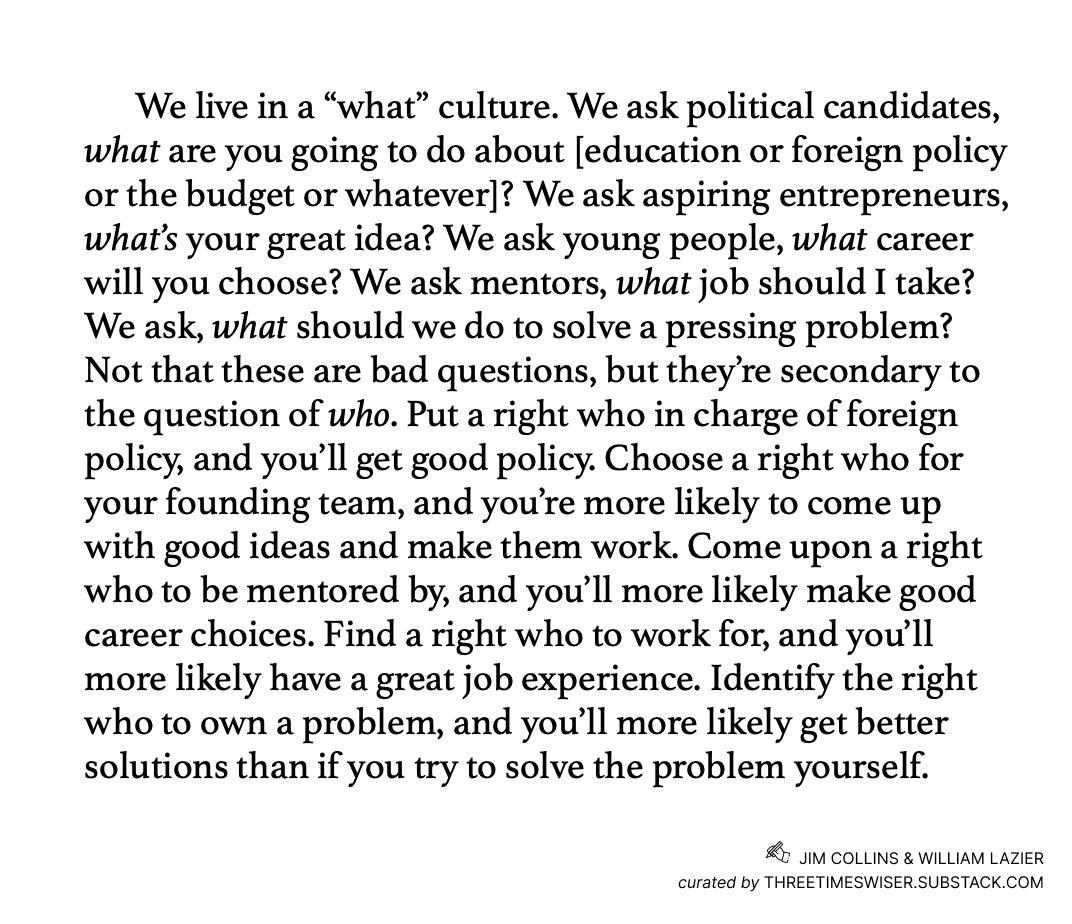🌱 5 new insights for product builders (#80)
How not to be boring; Steve Jobs on how to design insanely great products; Productivity anxiety; Choosing “who”; and Why companies want more high-output generalists
Jaryd here! 👋 You’re reading 5-Bit Fridays—your weekly ~5-minute roundup of 5 actionable insights that can help you build and grow your product.
Friends, Happy Friday! ☕
Before jumping in, I’ve been going ham reading this newsletter by the PostHog team. It’s one of my new favorites. It’s called Product for Engineers, but I’m no engineer and it’s packed with valuable info. If you’re working at an early-stage startup, which is most of you, I'm sure you’ll get a ton out of this letter. It’s 100% free, and very much worth subscribing below. Trust.
A few pieces of theirs I loved: Why you're bad at giving feedback; A/B testing mistakes I learned the hard way; How to get a job at a startup; How to do sales with no experience.
Otherwise, here’s what’s on the docket for today:
How not to be boring
Steve Jobs: How to design insanely great products
Productivity anxiety
Choosing “who”
Why companies want more high-output generalists
Let’s do it.
5 big ideas; 5 calls to action
(#1) Your website and brand are your first and most important opportunities to not be boring. Consider going weirdly hard on them…
“The world would be more fun if most startups hadn't undergone a personality bypass. But, sadly, most software companies look and feel the same. Founders have no end of excuses for this. It’s more important to build your MVP and validate it, or you need to find product-market fit and make money so you can survive. Creating a cool website won't help with either, right? …. Wrong.”
— James Hawkins (Founder/CEO of PostHog)
🫰 Why it matters: Your website is the cover of your
bookproduct, and never forget the fundamental law of humans (no matter what we all say)…we all judge books by their covers. If your website is boring, the market will think you and your product are boring. Nobody wants that.🔑 Bottom Line: Templated, generic, and/or just plain dull websites signal to people at the deepest level that the team behind the product isn't very strong, and that the product may not exist in a few months. The pages and ideas inside your book don’t matter if nobody flips past the cover.
🥇 Applying it: Spending time on your marketing website might seem "superficial" when you should be building a core product, but you need to put energy into your appearance. And when you do, it’s not just about polish, it’s about bringing personality into how your ICP experiences your brand. As James says, “A lot of design or brand work has an increasing marginal return. This is because a great brand's purpose is that you stand out. You don’t stand out by being average! So, if you're serious, go nuts on your brand. Go weirdly hard.”
Go deeper—How not to be boring
(#2) Related to the above idea, from the man with the greatest product sense of all time, “Obsess over every pixel, every corner, every transition”.
(Click the image to expand)
(#3) Ever feel stressed from the feeling that you’re not being productive enough? That’s productivity anxiety, and it strikes often when you are doing more than enough…
“Productivity dysmorphia is the false internal perception that you’re not being productive enough. People have been dealing with productivity anxiety for a long time, but I believe that the age of social media has brought on widespread feelings of productivity dysmorphia.”
🫰 Why it matters: Despite running this newsletter, having a 9-5 as a Director of Product, maintaining several hobbies, waking up at 5 am, and being a husband, friend, and brother, I routinely (usually in fact) find myself dealing with productivity anxiety. Ironically, the times I feel productivity dysmorphia the most are when I’m actually getting the most done. It’s like this ironic force that stops me from being in flow and leads to distractions and procrastination. It’s an anxiety that comes from overwhelm, and unfortunately, it’s the internet that often causes overwhelm in all of us. We live with constant comparisons being shoved in our face…we see other people starting a business, growing faster than us, or getting a raise, and we feel we need to do more. Overthinking from this comparison though is what will actually stop you from getting to your real goals.
🔑 Bottom Line: Even if you’re doing plenty of work and being more productive than the average person, it’s very normal to still feel like you’re useless and barely getting by. But it’s important for your actual productivity to notice that feeling when it arises and to remind yourself that you are being productive enough in order to protect both your mental health and your actual productivity.
🥇 Applying it: One thing that I’ve found to help, and so does Dr. Dan, is to spend less time on our phones and binging media. Obviously, we see content related to our interests, and we often see people with “more” than we have. This almost always creates unhealthy comparisons and leads to productivity dysmorphia and anxiety. Two other things that help: Meditation, and practicing Freudenfreude—where we find joy in someone else's joy, happiness, or good fortune
Go deeper—What is productivity anxiety?
(#4) The most powerful questions we should be asking start with “Who” because the “Who” we choose usually always has a bigger impact than the “What”…
🥇 Applying it: The next time you’re about to ask a question, frame it through the lens of “Who". Not “What do I want to be doing in 5 years?”, but “Who do I want to be, and who do I want to be doing it with?
Go (much) deeper—Beyond Entrepreneurship (Jim Collins and Bill Lazier)
(#5) Companies are looking for high-output generalists who can move projects (and the business) forward fast and with limited resources
“I need progress speed, not perfection. I need a plan to align around. I need someone willing to make judgment calls or decisions with imperfect information. And I need a narrative to get others engaged. So I need a high-output generalist.”
— Greg & Taylor from Personal Math
🫰 Why it matters: High-output generalists know how to drive ambiguous and unstructured things forward. They can be dropped into any situation and have the breadth and enough depth of skill/specialty to make quick progress.
🔑 Bottom Line: The hallmark of a generalist is their ability to combine 5 key skills, usually being excellent at 2/3 and good at the others. They are Speed, Self-sufficiency/Resourcefulness, Calmness in Chaos, Prioritization, and they know how to Get to V1 fast. Generalists are great at navigating The Work In Progress, and especially for companies tackling something new with lots of open questions, bringing in a generalist is becoming the go-to move.
🥇 Applying it: If you want to be more of a generalist yourself, use those 5 traits as a rubric to assess yourself and then level up on areas where you may be weaker. But if you want to hire a generalist—who are hard to spot with general interview questions—the place to do that is the takehome assignment. As Greg & Taylor say, “I’m focused on making take-home assignments even more challenging and representative of the realities of work today – tight timeframes, incomplete information, and open-ended questions. It’s the best way I’ve seen (so far) to get a sense for high-output generalist skills like speed, self-sufficiency, and getting to V1.”
3 bits of bonus content for the curious….🧑🎓
(1/3) Tools I’m currently using to grow 🛠️
I use Open for guided meditations. I like to test new mindfulness apps out, and this is one that’s really been sticking with me. (Learn more)
I use Circeback as my AI notetaking co-pilot. I hardly write notes anymore during meetings, and it’s a beautiful thing. (Learn more)
I use Perplexity as my new defacto search. I very seldom Google something anymore, it all goes into Perplexity. (Learn more)
(2/3) How I can help you grow 🤝
Are you a founder looking to grow your business without breaking the bank? If so, I’ve invested in a company (Athyna) that can help you find incredible talent and build out your global team in less than 5 days. Their product, service, and worldwide talent pool are just amazing (and so affordable). Learn more here ↗
(3/3) Other interesting things I came across 🕳️🐇
And that’s everything for this week’s edition. If you enjoyed reading today’s letter, feel free to forward it to someone! Or if you’d like to both (1) support my work, and (2) unlock premium essays like these, consider upgrading to paid.
Otherwise, have a great weekend, and I’ll see you next time. ✌️
—Jaryd






From Jobs: "Simplicity is the ultimate sophistication". This quote is from Da Vinci, one of my heroes. One of my favorite quotes. Another hero is Dr. Edwin Land, inventor of the Polaroid camera. Land was a pure genius inventor. Read "Triumph of Genius". Lands patent war battle with Kokak. Dr. Land won. Dr land was Steve Jobs' hero mentor. The iPhone design was inspired by Dr. Lands' vision of a pocket device that can snap an instant self-contained photo. Dr. Land was born 5 minutes from me in Bridgeport, CT. Great minds come from CT.
Great newsletter and thanks for linking to my post about productivity anxiety & dysmorphia. It's helpful to see that others feel the same way. I've just subscribed!